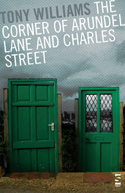Slim books can read and feel like perfectly chiselled miniature sculptures, easy to take in and easy to admire as a whole, or else like a deception - a small form hiding seemingly limitless depth, something like a Tardis or magic purse. Tony Williams' debut collection fits into the latter category. I've been dipping in and out of it for months now and I still don't feel like I've got a handle on everything that's going on inside, much less come to understand what makes a typical Williams poem.
Just when the picture of Williams as terror-oracle of the windy towns seems almost complete, you start discovering precise, carefully managed descriptive pieces ...
There is, of course, a distinct Northernness to the scenery (Williams grew up in Derbyshire and now lives in Sheffield) that immediately lends these pieces a certain character - worldly, yet unpretentious - and there is also a ready vein of roguish humour, often self-aware. The first two lines of 'Variations on the Fourth Eclogue' are a fine example:
Not every song of praise begins
skulking round dingy shrubberies
Beyond that, the book's defining traits are more difficult to make out. I was starting to come round to the idea of the poet as instigator, haunting provincial settings - towns, streets, pubs, squares - and urging the reader to witness what is darkly funny and devastating in them. His Matlock elegies are full of comic proclamation and intense, 'beyond sight' observations:
... The ghosts of John Smedley,
Rum-Tum Billy Young's Son and Mickey Morris
scouring the streets for the sons of children they remember,
to bother and bore with their dead gossip
In this, and in other poems, he uses the address as a system for some enjoyably over-the-top, spoof-archaic chest-beating and finger-pointing. Here he is in full flow in 'Homage to Julian Metcalf':
Roadhog! Congenital swine!
Champion of 'the boys' whom you nevertheless despise!
O sufferer of bad conscience and immoderate self-recrimination!
...jailbird of the senses, spiritual no-hoper!
...superfluous bloke!
...ubiquitous antihero of world-historical events!
If you enjoyed that gloriously melodramatic 'O', there's plenty more where it came from. But then, just when the picture of Williams as terror-oracle of the windy towns seems almost complete, you start discovering precise, carefully managed descriptive pieces like 'Great Edwardian', which could equally be a portrait of a cock pheasant as a gentleman or a gentleman as a cock pheasant. Or how about the exhuberant 'Variations on a Form by Gottfried Benn and Babette Deutsch', which reworks the same poem four times to take in vastly different settings and contexts, lurching from revolutionary Russia to contemporary hedonists hitting Europe? Then, in his winning assessments of 'Sand' and 'Gravel', and in his ode to errant schoolboys, Williams shows off a deeply empathetic side, making his subjects seem fascinating and fragile and emotionally real. A poem about gravel should, by rights, seem like desperate barrel-scraping. Here it has a satisfying crunch, partly because of the deft alternation between Popeian burlesque:
Joy to the hills for their Caesarean spawn!
Without it, whither helicopter landing pads,
whither boule, whither proliferation of fishing lakes?
- and playful characterisation:
Gravel hides the blood which the rain washes through it, betrays traspassers,
and realises locally the emptied landscapes dreamed of by centres.
It travels secretly in the treads of tyres, arrives,
exhausted, somewhere else, and disappears at once.
And there's more besides. 'The Looking Behind Walls Club' is grand for its title alone. There's the strange tension between the diversions into violent or indulgent periods of history ("a rare venison haunch/eaten by the vamp or weals across the backs/of malnourished and delinquent boys" in 'Argument About the Definition of Red'), as well as some of the coarser language, and the gentler, more pastoral turns, such as 'In Praise of Tinkering'. I still haven't got to the bottom of it all. I'm not sure I ever will.

Dr F sez: I think this Williams character is mocking me. How dare he.










